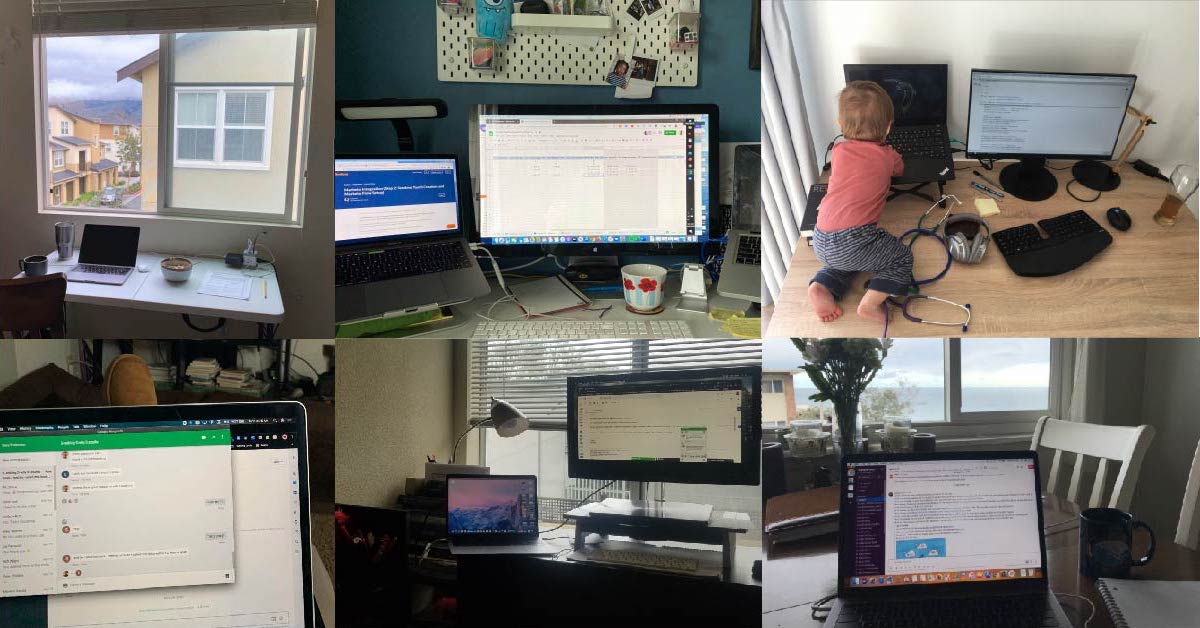Home office work: Find the perfect solution for your lifestyle
Published

What are the benefits of working remotely?
Working remotely has several benefits, including:
Flexibility: Remote work allows for more flexibility in terms of working hours and location. This can be particularly beneficial for people who have caring responsibilities, live in remote areas, or prefer a non-traditional work schedule.
Higher productivity: Studies have shown that employees who work remotely are often more productive than their office-based counterparts because they have fewer distractions and a more flexible work schedule.
Cost Savings: Remote work eliminates the need for commuting, saving both time and money on transportation. Additionally, teleworkers often save money on work-related expenses such as clothing, meals, and child care.

Those : desktrack.timentask.com
Better work-life balance: Remote work allows for a better work-life balance as employees can more easily balance their personal and professional commitments.
Access to a larger job market: Remote work allows workers to access job opportunities outside of their geographic region, increasing the chances of finding a job that is a perfect fit for their skills and experience.
Lower Stress: Remote work can be less stressful than traditional office work by eliminating the need to commute and allowing for a more flexible work schedule.
Overall, remote work offers a number of benefits that make it an attractive option for people seeking a more flexible and fulfilling career.
How are remote jobs different from traditional jobs?

Those : hbr.org
Remote jobs differ from traditional jobs in several ways, including:
Work Location: Remote workplaces allow workers to work from any location with an internet connection, while traditional workplaces require physical presence in an office or other designated work area.
Working Hours: Remote workplaces often offer more flexible working hours, allowing employees to set their own hours and meet other commitments. Traditional workplaces usually have a fixed schedule that must be adhered to.
Communication: Remote workplaces require workers to communicate primarily through digital channels such as email, chat, and video conferencing, while traditional workplaces often require face-to-face communication.
Collaboration: Remote workplaces require employees to collaborate remotely, often using project management software and other digital tools, while traditional workplaces typically involve in-person collaboration.
Management: Remote workplaces require managers to manage teams remotely, often using project management software and other digital tools, while traditional workplaces typically lead teams in person.
Work culture: Remote workplaces can have a different work culture than traditional workplaces, as remote employees often have more autonomy and independence and may not have the same socializing and team-building opportunities as on-site employees.
Overall, remote jobs offer a different work experience than traditional jobs as they offer more flexibility and autonomy, but also require strong communication and collaboration skills to thrive in a digital work environment.
What are the most popular industries for remote work?

Those : techrepublic.com
There are several industries that have embraced remote work and are currently offering many remote jobs. Some of the most popular industries for remote work include:
Information Technology (IT): The IT industry is one of the most popular industries for remote work because many IT activities can be performed remotely, such as: B. Software development, network management and cybersecurity.
Customer Support: Many customer service tasks can be completed remotely, including telephone and email support.
Education: Education jobs that can be done remotely include online teaching, tutoring, and curriculum development.
Marketing and Advertising: Many marketing and advertising tasks can be completed remotely, such as: B. content creation, social media management and digital advertising.
Healthcare: Remote healthcare jobs include telemedicine, medical coding and billing, and healthcare consulting.
Finance: Remote jobs in finance include accounting, bookkeeping, and financial analysis.
Writing and editing: Many writing and editing jobs can be done remotely, including journalism, copywriting, and technical writing.
Creative Fields: Remote work opportunities exist in creative fields such as graphic design, web design, and video production.
Overall, remote work opportunities exist across a variety of industries, and the remote work trend is expected to continue to grow in the coming years.
How to Find Remote Work Opportunities?

Those : ryrob.com
There are several ways to find remote work jobs:
Job search sites: Many job search sites such as Indeed, LinkedIn, and Glassdoor offer filters that allow you to specifically search for remote work opportunities.
Company Career Pages: Many companies that offer remote work positions have job advertisements posted on their career pages.
Freelancing platforms: Freelancing platforms like Upwork and Fiverr offer the opportunity to work on a project basis, and many of these projects can be completed remotely.
Networking: Networking can be a valuable way to find remote work opportunities. Reach out to former colleagues, attend industry events, and join online communities to expand your network.
Remote work job boards: There are several job boards that specialize in remote work, such as: E.g. FlexJobs, Remote.co and We Work Remotely.
Social Media: Follow companies that offer remote work opportunities on social media and participate in their content. Companies can post job advertisements on their social media pages.
Recruiters: Some recruiters specialize in placing candidates for remote jobs. Reach out to recruiters in your industry to see if they have remote job openings.
Using these methods, you can increase your chances of finding remote work opportunities that match your skills and experience.
How can you prepare for a remote work interview?

Those : associationsnow.com
Preparing for a remote interview requires a few additional steps beyond a typical in-person interview. Here are some tips to help you prepare:
Test your technology: Make sure your internet connection, webcam and microphone are working properly. Test your technique in advance to avoid technical problems during the interview.
Choose a quiet, distraction-free place: Find a quiet place where you can have the conversation without distractions. Make sure you have good lighting and a neutral background.
Dress professionally: Dress as you would for an in-person interview, even if you are conducting the interview from home. This will help you put yourself in the right mood and present yourself professionally.
Research the company: Research the company and the position you are applying for. Find out about the company's telecommuting policies and company culture.
Prepare your answers: Prepare for the most common interview questions and have examples that illustrate your skills and experience. Practice your answers with a friend or family member.
Ask questions: Prepare questions to ask the interviewer about the position, company culture, and remote work experience.
Follow-up: After the interview, send a thank you email to the interviewer reiterating your interest in the position and thanking them for their time.
By following these tips, you can prepare for an interview and present yourself as a professional and qualified applicant.
What are the key skills and qualifications employers are looking for when working remotely?

Those : flexjobs.com
Remote employers look for a combination of technical skills, soft skills and qualifications. Here are some of the top skills and qualifications remote employers are looking for:
Technical skills: Depending on the job, remote employers look for technical skills, e.g. B. mastery of a specific software or programming language.
Self-motivation and discipline: Working remotely requires a high level of self-motivation and discipline. Employers look for applicants who can manage their time effectively and concentrate on their work.
Communication skills: Effective communication is crucial when working remotely. Employers look for candidates who can communicate clearly and professionally via email, chat and video conferencing.
Adaptability: Remote work can involve a lot of change and uncertainty. Employers look for candidates who can adapt to changing circumstances and remain flexible.
Collaboration: Many remote jobs require you to work with a team. Employers look for candidates who can work together effectively and contribute to positive team dynamics.
Education and Experience: Employers typically look for applicants with relevant education and work experience, with specific requirements depending on the position.
Time management: Remote work requires good time management. Employers look for candidates who can prioritize tasks and meet deadlines.
Having these skills and qualifications will increase your chances of being hired for remote work.
How do you manage your time when working remotely?
When you work remotely, you need to manage your time well to stay productive and focused on your work. Here are some tips to help you manage your time effectively:
Create a routine: Create a consistent routine that includes regular work hours, breaks, and time for other activities outside of work.
Set Goals and Priorities: Prioritize your tasks and set goals for what you want to accomplish each day. This will help you stay focused and motivated.
Use a to-do list or planner: Use a to-do list or planner to keep track of your tasks and deadlines. This will help you keep track and make sure you don't forget anything.
Minimize distractions: Identify potential distractions in your workspace and take steps to minimize them. This may include turning off notifications, closing unnecessary tabs or apps, or using noise-canceling headphones.
Take breaks: Take regular breaks throughout the day to recover and stay focused. This could be a walk, a few stretches, or simply taking a few minutes away from your workspace.
Communicate with your team: Talk to your team about your schedule and availability. This will help you avoid conflict and ensure everyone involved is on the same page.
Learn to say no: When you work remotely, it's easy to find yourself taking on too much work or becoming distracted by other tasks. Learn to turn down tasks or projects that aren't absolutely necessary or that would take too much time.
By following these tips, you can effectively manage your time while working remotely and stay productive and focused on your work.








